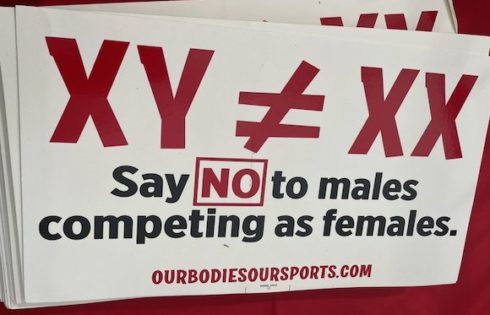
UPDATED
Could face legal liability for violating promise to students, says civil liberties group
Case Western Reserve University refuses to explain how a referendum policy does not enable viewpoint discrimination against student organizations, following a referendum regarding a pro-life club.
The results of the May 4 vote on whether to revoke recognition from Students for Life should be public by now, according to the timeline provided by a student government official.
But the administration ignored College Fix questions about the status of the referendum and whether the private Ohio school could face legal liability for promising students freedom of expression while subjecting club recognition to a popularity contest.
The Foundation for Individual Rights in Education criticized the referendum procedure as “incompatible” with the private university’s Policy on Freedom of Expression and Expressive Activities.
FIRE contends that “private institutions that promise their students expressive rights cannot deny official recognition to student organizations based on viewpoint.”
Students for Life of America is “disappointed that pro-life students on campus are being targeted for their beliefs,” spokesperson Matt Lamb told The Fix in an email. “We hope the university will come out and make a statement in support of free speech and that the group will be allowed to remain on campus.”
‘Stigma is a form of passive violence‘
While the Undergraduate Student Government was in the midst of voting on whether to approve the pro-life organization, two pro-choice students published a five-page letter urging them to reject the club.
Caleb Curry and Virginia Behmer wrote that the Students for Life club “has the potential to cause harm to others of the student body,” owing to the “scientific evidence” that women who procure abortions suffer from “social stigma.”
This stigma “would be exacerbated” by the presence of a pro-life club, regardless of how it behaved, they claimed. “Stigma is a form of passive violence.”
They agreed that “political expression and freedom of speech are important,” then asked rhetorically “how much freedom is too much?” Without providing evidence, the duo said the “message” promoted by Students for Life “is especially harmful and connected to a national and local history of hard-line violence and grotesque postings.”
After the vote, in which representatives voted anonymously, Curry, Behmer and three other students published a “dissent” petitioning the USG for a referendum on its decision. “Protesting or holding ‘peaceful vigils’ outside of [abortion] care providers,” which are common pro-life activities, “is tantamount to medical terrorism,” reads the dissent, which is addressed to CWRU students.
The co-authors also claimed that the “action-proposals” of the pro-life club violate the Student Code of Conduct (“behavior that endangers the physical or mental health or safety of any person”) and policy on freedom of expression (“Invades substantial privacy or confidentiality interests”).
MORE: ‘Academic freedom’ can’t be revoked for PR reasons, court rules
Both the letter and the dissent include links to sign petitions on Google Docs, but neither can be viewed without the owner granting access.
Curry declined to grant access to The Fix, writing in an email that the documents include “personal student signatures and testimonials only available and meant for CWRU affiliates.”
The petition needs about 490 students to sign, according to the dissent, given that the university requires 10 percent of the undergraduate body to support a petition in order to trigger a referendum. (It’s not clear how the dissent arrived at that undergraduate count. CWRU’s latest figures, from fall 2019, show undergraduate enrollment of 5,383.)
A simple majority will approve the referendum, but in order to count, at least 20 percent of the undergraduate student body must vote in the referendum, according to USG’s governing documents.
Alex Gould, USG vice president of public relations, told Campus Reform the organizers triggered the referendum by collecting more than 600 signatures. He claimed the results wouldn’t be available for two weeks after the May 4 vote. The Fix contacted CWRU Wednesday night – 16 days later – to obtain the results, without success.
Another SFLA spokesperson, Kristi Hamrick, told The Fix that the petition was an act of “viewpoint discrimination and thuggish bullying.”
Pro-choice activists are “[a]ttempting to block pro-life people from access to their free speech rights by defaming their reputations,” she wrote in an email, apparently referring to the petition’s allegations about the group’s activities. Yet pro-life students “will not be intimidated as they fight for women and their children, born and pre-born,” Hamrick said.
MORE: Judge rebukes Fordham for viewpoint discrimination against student group
The ‘availability’ of the referendum process is a problem in and of itself
In a blog post Wednesday, FIRE said the referendum process violates the promises that “Case Western is morally and contractually obligated to uphold.”
The policy on freedom of expression, which pro-choice students claim Students for Life is violating, actually obligates the university to grant pro-life students “the fullest possible right to …. challenge, inquire and learn,” even if their ideas “conflict” with those of others, FIRE said.
The referendum process gives students “unbridled discretion to defund student organizations that maintain viewpoints some find offensive or disagreeable,” and the letter and dissent make clear that the referendum was “purely viewpoint-motivated,” the civil liberties group said. It noted that as few as 10 percent of students can strip a recognized club of its status under CWRU policy.
Regardless of the outcome of the referendum, the “availability” of this process “continues to pose a threat to students’ rights to freedom of expression and association at Case Western.”
The Fix asked the administration how it will respond in the event the referendum passes, why it has a policy that allows viewpoint discrimination through simple majority votes, and whether CWRU plans to change the policy to adhere to its own freedom of expression policy.
A spokesperson responded that the university “is firmly committed to the principles articulated in the university’s Freedom of Expression policy. At the same time, we believe strongly in the value of organizations like Undergraduate Student Government to the overall educational experience”:
The broader question at issue here has been a subject of intense national debate and emotion for decades. When the new academic year begins, we will engage students in broad discussions about this referendum, freedom of expression, and the critical importance of talking and listening to different perspectives in a democratic society.
The spokesperson did not answer Fix questions or provide the status or outcome of the referendum.
UPDATED: A petition author declined to grant access to The Fix after this article was published.
MORE: Activists warn campus officials may use COVID-19 as excuse to stifle free speech
IMAGE: Bashigo/Shutterstock
Like The College Fix on Facebook / Follow us on Twitter






Please join the conversation about our stories on Facebook, Twitter, Instagram, Reddit, MeWe, Rumble, Gab, Minds and Gettr.